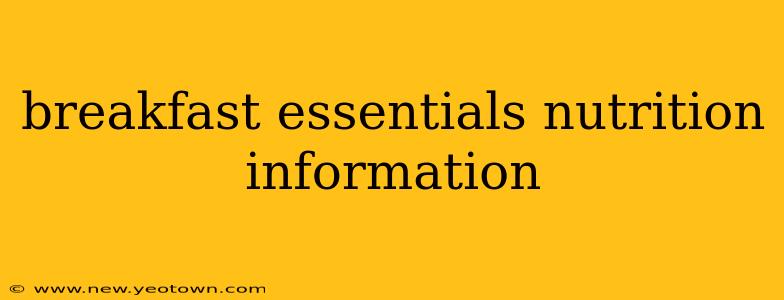Breakfast, they say, is the most important meal of the day. But what makes a breakfast truly essential? It's not just about grabbing something quick; it's about fueling your body with the right nutrients to power your mind and body throughout the morning. This isn't about strict diets or restrictive eating; it's about understanding the building blocks of a healthy, energizing breakfast and incorporating them into your daily routine. Let's dive in!
What are the key nutrients I need in my breakfast?
This is a fantastic question, and the answer is multifaceted. A truly essential breakfast should provide a blend of macronutrients and micronutrients. Think of it like this: macronutrients are the large-scale fuel sources (carbohydrates, proteins, and fats), while micronutrients are the vital vitamins and minerals that support countless bodily functions. A well-rounded breakfast will include:
-
Complex Carbohydrates: These provide sustained energy release, preventing that mid-morning slump. Think whole grains like oatmeal, whole-wheat toast, or quinoa. Avoid refined carbs like sugary cereals which lead to quick energy spikes followed by crashes.
-
Protein: Essential for building and repairing tissues, protein keeps you feeling full and satisfied. Good sources include eggs, Greek yogurt, nuts, and seeds.
-
Healthy Fats: These are crucial for hormone production and nutrient absorption. Avocados, nuts, seeds, and olive oil are excellent choices.
-
Fiber: Found in fruits, vegetables, and whole grains, fiber aids digestion and promotes regularity. It also contributes to satiety, helping you stay full longer.
-
Vitamins and Minerals: A diverse range of fruits and vegetables ensures you're getting a wide array of vitamins and minerals, supporting overall health and wellbeing.
What are some examples of a nutritious breakfast?
The beauty of a nutritious breakfast lies in its versatility. There's no one-size-fits-all answer, but here are a few ideas to get you started:
-
Overnight Oats: Combine rolled oats, milk (dairy or non-dairy), chia seeds, and your favorite fruits for a simple, customizable breakfast. The overnight soak softens the oats and creates a creamy texture.
-
Greek Yogurt with Berries and Nuts: A protein-packed powerhouse, this combination provides sustained energy and essential nutrients.
-
Scrambled Eggs with Whole-Wheat Toast and Avocado: Eggs are an excellent source of protein, while avocado adds healthy fats and fiber. Whole-wheat toast provides complex carbohydrates.
-
Smoothie: Blend fruits, vegetables, protein powder (optional), and a liquid base for a quick and easy way to get a wide variety of nutrients. Experiment with different combinations to find your favorites.
How many calories should my breakfast contain?
The ideal calorie intake for breakfast varies depending on factors like age, activity level, and overall caloric needs. However, a general guideline is to aim for a breakfast that comprises about 20-25% of your total daily calorie intake. This ensures you have enough energy to start your day without feeling overly full or sluggish. Focus on nutrient density rather than solely on calorie count.
What are some quick and easy breakfast ideas for busy mornings?
Busy mornings don't have to mean sacrificing nutrition. Here are some quick and easy options:
- Pre-portioned overnight oats: Prepare several servings on the weekend and grab one each morning.
- Whole-wheat toast with nut butter and banana: A quick and easy source of carbohydrates, protein, and healthy fats.
- Hard-boiled eggs: A portable and protein-rich option.
- Yogurt parfait: Layer yogurt, granola, and berries for a satisfying and nutritious breakfast.
What are some breakfast options for weight loss?
Breakfast plays a significant role in weight management. Prioritizing protein and fiber-rich foods helps you feel fuller for longer, reducing overall calorie intake throughout the day. Some examples include:
- High-protein smoothie: Blend protein powder, spinach, berries, and a liquid base.
- Greek yogurt with fruit and a sprinkle of granola: A balance of protein, fiber, and healthy carbohydrates.
- Scrambled eggs with vegetables: A high-protein, low-calorie option.
Remember, the key to a truly essential breakfast is consistency and balance. By incorporating a variety of nutrient-rich foods, you'll provide your body with the fuel it needs to thrive throughout the day. Experiment with different combinations, find what works best for you, and enjoy the delicious and energizing start to your day!

